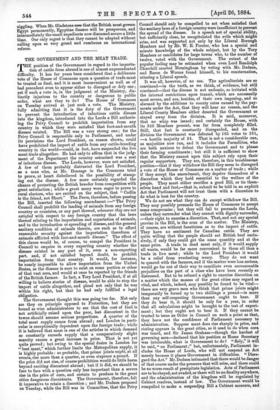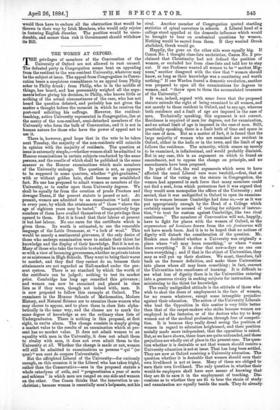THE GOVERNMENT AND THE MEAT TRADE.
THE position of the Government in regard to the importa- tion of cattle from abroad is one of almost unprecedented difficulty. It has for years been considered that a deliberate
vote of the House of Commons upon a question of trade must be treated as final, and it is most inconvenient as well as of bad precedent even to appear either to disregard or defy one ; yet if such a vote is, in the judgment of the Ministry, dis- tinctly injurious to the country or dangerous to public order, what are they to do ? The House of Commons on Tuesday arrived at just such a vote. The Ministry, fully admitting that it is the duty of the Government to prevent the introduction of infectious cattle disease into the kingdom, introduced into the Lords a Bill authoris- ing the Privy Council to prohibit importation from any
country in which they were satisfied that foot-and-mouth disease existed. The Bill was a very strong one ; for the Privy Council is responsible only to Parliament, and under its provisions the Lord President, on reason shown, could have prohibited the import of cattle from any cattle-breeding country in the world—could, in fact, have suspended the live meat trade altogether. He had only to affirm that in the judg- ment of the Department the country ostracised was a seat of infectious disease. The Lords, however, were not satisfied. A few of them probably distrusted the Lord President, as a man who, as Mr. Heneage in the Commons tried to prove, at heart disbelieved in the possibility of stamp- ing out the disease. A few more certainly regarded the chance of protecting the British breeder from competition with great satisfaction ; while a great many were eager to prove to rural electors, who are excited on the subject, that " Codlin is the friend, not Short." The Peers, therefore, before passing the Bill, inserted the following amendment :—" The Privy Council shall prohibit the landing of animals from any foreign country or countries, or any part thereof, whenever they are not satisfied with respect to any foreign country that the laws thereof relating to the importation and exportation of animals, and to the introduction or spreading of disease, and the general sanitary condition of animals therein, are such as to afford reasonable security against the importation therefrom of animals afflicted with foot-and-mouth disease." The effect of this clause would be, of course, to compel the President in Council to enquire in every exporting country whether the disease existed in any part of it, even a non-exporting part, and, if not satisfied beyond doubt, to prohibit importation from that country. It would, for instance, be nearly impossible to allow importation from the United States, as the disease is sure to exist on some portion or other of that vast area, and would at once be reported by the friends of the British farmer. In fact, a Tory Lord President, if at all willing to believe stories of disease, would be able to stop the import of cattle altogether, and plead not only that he was within his right, but that he had only fulfilled a legal obligation.
The Government thought this was going too far. Not only are they on principle opposed to Protection, but they are bound as wise administrators to see that the cost of food is not artificially raised upon the poor, lest discontent in the towns should assume serious proportions. A quarter of the total meat supply comes from abroad ; and London in parti- cular is exceptionally dependent upon the foreign trade ; while it is believed that meat is one of the articles in which demand so constantly exceeds supply that a comparatively slight
scarcity causes a great increase in price. That is not yet quite proved ; but owing to the special desire in London for
" best meat," which further limits the Metropolitan supply, it
is highly probable : so probable, that prime joints ?night, at all events, rise more than a quarter, or even sixpence a pound. If
the price did not rise, of course prohibition would do little harm
beyond exciting discontent abroad ; but if it did, we should be face to face with a question only less important than a severe rise in the price of corn, and certain to produce in the great cities dangerous discontents. The Government, therefore, felt it imperative to retain a discretion ; and Mr. Dodson proposed on Tuesday, while the Bill was in Committee, that the Privy Council should only be compelled to act when satisfied that the sanitary laws of a foreign country were insufficient to prevent
the spread of the disease. In a speech not of special ability, but sufficiently clear, he recapitulated the evils which might arise, and was supported not only by the Liberal Borough Members and by Mr. W. E. Forster, who has a special and minute knowledge of the whole subject, but by the Tory Members or candidates for large towns who, to the number of twelve, voted with the Government. The extent of the popular feeling may be estimated when even Lord Randolph Churchill courted Birmingham by voting with Mr. Dodson, and Baron de Worms found himself, to his consternation, uttering a Liberal speech.
It was all, however, of no use. The agriculturists are so convinced—in the teeth, as we think, of evidence, but still convinced—that the disease is not endemic, so irritated with the internal restrictions upon transit, which are necessarily most severe, and are, besides, of their own imposing, and so alarmed by the additions to county rates caused by the pay- ments under the Act, that they will hear no reason, and the Liberal County Members either deserted the Government or stayed away from the division. It is said, moreover, that no whip was issued ; and certainly the House, with its 346 Members present, was far from completely filled.
Still, that fact is constantly disregarded, and on the division the Government was defeated by 185 votes to 161, —a hostile majority of 24. That is not a considerable one,
as majorities now run, and it includes the Parnellites, who are both anxious to defeat the Government and to please
their farming constituents ; but still it is sufficient to show
that the Ministry cannot upon this subject rely upon their regular supporters. They are, therefore, in this troublesome
position—that if they withdraw the Bill they seem to disregard a vote of the House of Commons on a matter of trade ; while if they accept the amendment, they deprive themselves of a discretion which they hold essential to the welfare of the people. They must either sacrifice a good Bill, or tie them- selves hand and foot,—that is, submit to be told in an explicit Act that Parliament will not trust them with a discretion to do what is best for the country.
We do not see what they can do except withdraw the Bill. They may possibly persuade the House of Commons to accept some compromise ; but they will fail to persuade the Lords, unless they surrender what they cannot with dignity surrender, —their right to exercise a discretion. That, and not any special proviso in the Bill, is the crux of the matter. The Ministry, of course, are without fanaticism as to the import of cattle. They have no sentiment for Canadian cattle. They are quite willing that the people should eat British beef exclu- sively, if only they could get the same quantity and at the same price. A trade in dead meat only, if it would supply all wants, would be far more convenient to them all than a trade in live meat ; while to the Lord President it would be a relief from everlasting worry. They do not want to quarrel with the farmers, and if the matter were less serious,
would go far out of their way to conciliate even unreasonable prejudices on the part of a class who have been recently so
distressed. But to be refused a right to exercise discretion on
a matter which the masses of the great cities may regard as vital, and which, indeed, may possibly be found to be vital— there are very grave men who think that prime joints might temporarily be forced up to two shillings a pound—is more than any self-respecting Government ought to bear. If they do bear it, it should be only for a year, in order that all calculations might be brought to the test of experi- ment ; but they ought not to bear it. If they cannot be trusted to issue an Order in Council on such a point as that, they have not the confidence of Parliament necessary to administration. Suppose meat does rise sharply in price, and rioting appears in the great cities, as it used to do when corn was taxed, and Sir James Graham—thoagh the hardest of governing men—declared that his position as Home Secretary was intolerable, what is Government to do ? "Rely," it will be said, " on Parliament ;" but, unfortunately, Parliament in- cludes the House of Lords, who will not suspend an Act merely because it places Government in difficulties. " Disre- gard the Act." Mr. Dodson intimated that there would be danger of that course under the pressure that will arise, and there could be no worse result of precipitate legislation. Acts of Parliament are to be obeyed, not evaded, or there will be no finality anywhere, and the administration of the kingdom will be regulated by Cabinet resolves, instead of law. The Government would be compelled to make a suspending Bill a Cabinet measure, and would then have to endure all the obstruction that would be thrown in their way by Irish Members, who would only rejoice in fostering English disorder. The position would be unen- durable, and sooner than risk it Government should withdraw its Bill.



































 Previous page
Previous page